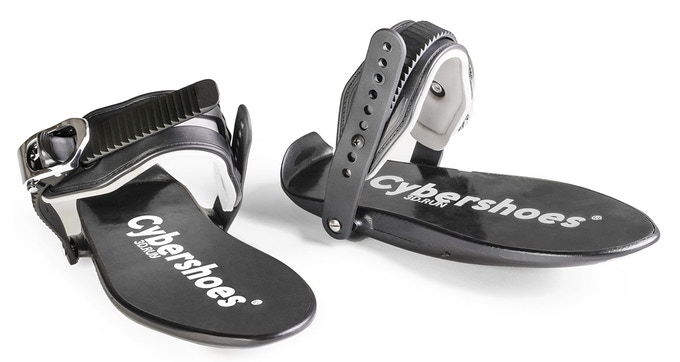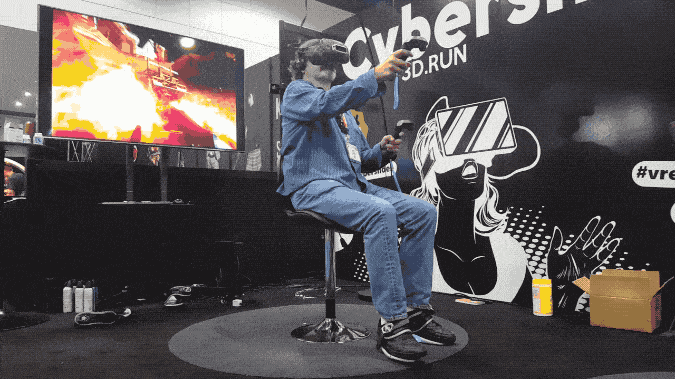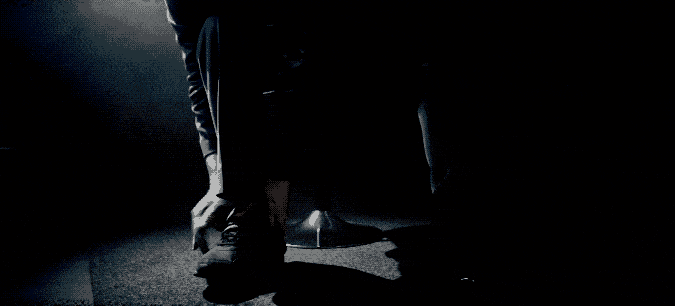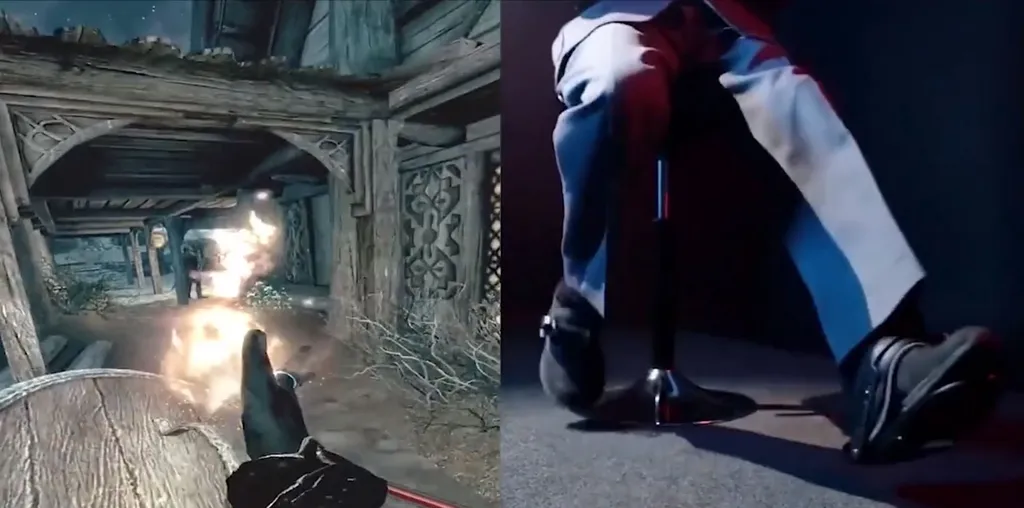Before I talk about the Cybershoes, it’s important to frame the color the experience with framing from my past that I think many of our readers will relate to on some level. One of my first modern VR experiences was EVE: Valkyrie back at E3 2015 on the (then) Project Morpheus headset from Sony — a game in which you’re flying through space at blistering speeds and shooting down enemies. After that I got a Gear VR for my Samsung Galaxy phone shortly after and was forced to sit, stationary and unmoving, and just look around the room. Two polar opposite sensations. Then the Rift and Vive came out in 2016 and redefined how I viewed video games, with one major stipulation: physical boundaries.
When I played Job Simulator for the first time, I wanted to walk around the office. When I played The Gallery, I wanted to explore the entire beach coastline. When I played Vanishing Realms, I wanted to sprint down corridors past traps. Eventually developers started including artificial locomotion so you can just use the analog stick on the Oculus Touch controllers or the track pad on the HTC Vive wands to “slide” across the world like you do in non-VR games, but that’s an imperfect solution. It lacks physicality and tactile feedback on my body and in some cases just feels clumsy.
I’ve tried omnidirectional treadmills like the Virtuix Omni. I’ve tried the 3dRudder. I’ve seen the Kat Walk Mini in action. But those are all imperfect as well. While I’m not saying that the Cybershoes are perfect by any means, they do a wonderful job of delivering a direct physical interaction with the virtual world to cause movement that is both easy to use, comfortable, and above all else, surprisingly immersive.
To be honest, I was skeptical of the Cybershoes. After seeing their Kickstarter rapidly explode over the last few weeks it seemed like a lot of empty hype. The company contacted me to send a unit to my house to try in my own time and after spending about a week toying around with the device in Skyrim VR, DOOM VFR, Fallout 4 VR, and even Onward, my thoughts are turning around a bit.

Included with the Cybershoes themselves (shown above) the company sent me a swiveling bar stool-style chair, a circular rug, and an IKEA-style lamp stand to run the wires above my head.
The way the Cybershoes work are that you strap them onto the bottom of whatever shoes you’re already wearing — the strap itself reminded me of rollerblades. They’ve got rollers on the bottom that track your feet movement across the ground and transmit that back to your PC in the form of movement inside the game. You need carpet or a rug for it to work well (they’ll ship with a circular carpet if you need it.)
So you sit in a swivel chair and you rub your feet across the ground to move. It sounds silly and it looks even sillier, but anyone that has a VR headset obviously has already surrendered to looking ridiculous. It actually works really well — surprisingly well, in fact. Personally I’ve never been one to get motion sick and I prefer to stand while in VR 90% of the time, but I actually enjoyed using these wonky shoe thingies. Swinging my feet in a chair isn’t the same as running on a Ready Player One-style treadmill, but in some ways it is better than moving a joystick in my hand.
Although running the wires above my head was a bit annoying to be honest. Having the cable dangling above me meant I could vaguely feel it tug every now and then. I didn’t get to try it out with the Vive Wireless Adapter, but I’d have really loved to do so.

Right now the Cybershoes only officially support HTC Vive and, for the most part, using them solves my biggest issue with the Vive as a VR platform: the controllers. If a game or app supports both Vive and Rift and I need to pick one, I always opt for Rift because of the Touch controllers. I just really, really dislike using the track pads for movement. But when wearing Cybershoes, I don’t have to awkwardly rub my thumb on the controller to move around, so suddenly the Vive wands are much better as just tools in my hand. Wielding a sword in Skyrim VR is more satisfying with a Vive wand than it is with a Touch controller, for example.
However, there is a huge loss of interactivity in some cases since you’re forced to sit down at all times. This means you can’t go prone in a game like Onward, or crouch down to sneak in Skyrim VR. You can’t physically jump to the side to dodge a rocket in DOOM VFR or quickly spin around to block a sword slash. Instead of whipping your body around in real life, you have to shuffle your feet and spin around in a chair which, frankly, is a bit annoying and inaccurate.
So it’s sort of a mixed bag in terms of immersion. But for some titles, like the ones that you wouldn’t typically move around the room in much and generally stand still, the Cybershoes seem like a marked improvement.

It’s also worth noting that the setup process, while relatively easy, is a bit intrusive for your space. For me, I have a home office that doubles as my VR room so I don’t mind leaving the lamp stand setup and just moving it to the side when not in use, but for some people it’d be inconvenient.
Cybershoes aren’t a massive leap forward for the VR industry, but it’s still a surprisingly convincing alternative for movement in VR. As of the time of this writing, the Cybershoes Kickstarter has raised over $235,000 of an originally stated $34,095 goal — the campaign ends on November 1st, 2018. That’s a huge success. However, if we can learn anything from recent headlines, Sixense proves that having a successful Kickstarter campaign is only the first step. Now the company has to produce and deliver the product to consumers.
What do you think about the Cybershoes? Are you going to back them? Would you buy a pair? Let us know down in the comments below!






























